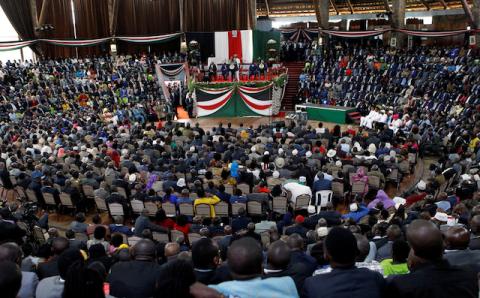Advertisement
Kenyan government report proposes more posts to tackle election violence
NAIROBI (Reuters) - Kenya should create more senior political posts including that of prime minister and increase payments to regional governments to try to end cyclical election violence, a government report said on Wednesday.
The report, which also recommended cutting government spending, was drawn up by a commission formed following a reconciliation between President Uhuru Kenyatta and his rival Raila Odinga after a national election in which 100 people, most of them protesters, were killed in a national election in 2017.
But critics saw the findings as window dressing designed to increase the number of senior officials with access to resources, rather than as a serious attempt to tackle graft that has hollowed out social services such as health and education.
Election campaigns in Kenya are often fought by ethnically-based alliances. Voting shows strong ethnic patterns, and so does the political violence that often follows.
"A winner take-all political system has only sharpened the ethnic competition for the presidency," the report said. "People want one of their own as president since resources go with the presidency."
To combat the problem, the president should appoint a prime minister from the party with most lawmakers in parliament, the report said. Kenya's government is led by the president, and the country does not have a prime minister.
The report said county governments, which are responsible for early education, healthcare and some infrastructure, should receive at least 35% of national revenue compared to 15% now.
A 2010 constitution devolved many powers and some funding to 47 newly created counties in an earlier attempt to prevent election violence. But the county governments have struggled to fulfil their responsibilities, partly because of corruption and partly because of a lack of funds.
The report also proposed the runner-up of the presidential election become the official leader of the opposition, a new post.
"MUDDLED, INCOHERENT"
The government has failed to meet revenue collection targets and has borrowed heavily though Kenya has the region's richest economy.
Prominent anti-corruption campaigner John Githongo was scornful of the report.
"It's a muddled incoherent document full of tribal sinecures," Githongo said.
"It's a rather cynical vacuous document ... offered up by an elite that has raided national coffers to the point of fiscal distress - yet the document makes no acknowledgement of that."
(Additional reporting by David Lewis, Editing by Katharine Houreld and Timothy Heritage)



















Add new comment